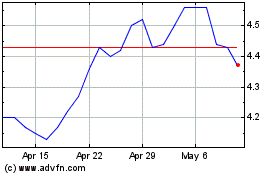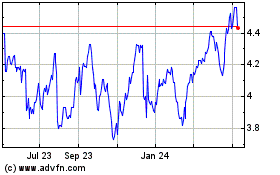Some of the world's biggest telecommunications firms are this
week poised to win a round in their global slugfest with Silicon
Valley—at least in Europe.
The European Union's executive arm is expected this week to
propose subjecting online services like Microsoft Corp.'s Skype and
Facebook Inc.'s WhatsApp to some of the same rules that have long
regulated the telecoms business, according to tech and telecom
lobbyists briefed recently by EU officials.
Skype, for example, may have to offer emergency-calling services
for European customers who use its online-voice service to dial
traditional phone numbers. In cases where it assigns users
telephone numbers—allowing for the receipt of calls from
traditional phones—it could also be required to let those users
take their numbers with them if they decide to move to a different
provider.
Chat-service WhatsApp, meanwhile, could be subject to new
oversight from national telecom regulators on topics like network
security.
The draft proposals are still in flux. But what is clear is that
the EU is proposing to move in a direction telecom executives have
been pushing for years. The executives say they want a "level
playing field" with tech companies amid all the new, mostly free,
online communications services that they perceive to have
undermined telecoms' traditional voice and text services.
They have long wanted the EU to repeal some of the
industry-specific regulations they face, particularly on user
privacy. Failing that, they have pushed to extend some of the same
telecom rules to internet-based services.
"It would be better to remove rules for us," said one telecom
executive who has been briefed on the proposals. "But this is real
progress."
A European Commission spokeswoman said the proposed rules, which
also seek to spur improvement in the continent's
high-speed-internet networks and cellular-airwave-allocation
process, are part of the EU's strategy to "encourage investments in
next-generation networks, set the right conditions for modern
digital networks and provide a level playing field for all market
players."
The proposals still face potentially years of debate and changes
before adoption. But they represent a rare boost to
telecommunications companies in their skirmishes with Silicon
Valley's powerful lobbying machinery.
While telecom executives increasingly acknowledge that services
like Snapchat and WhatsApp help them sell more-expensive data
plans, in many parts of the world they have also been on the
defensive about how those so-called "over-the-top" services have
eaten into their traditional offerings.
The two sides have also clashed over regulatory issues including
net neutrality in the U.S., connecting the developing world, and
the question of who will profit from the detailed information both
sets of companies have on the online and offline habits of their
customers.
The battle lines are particularly clear in Europe, where
carriers were slower than those in the U.S. in switching to make
money from selling data rather than voice and texts. Telecom
giants, like Spain's Telefonica SA and Germany's Deutsche Telekom
AG, have long chafed that their services face industry-specific
taxes and restrictions that similar offerings from big tech firms
don't.
Big tech companies reject that notion. They argue that while
they sometimes offer comparable services, their businesses contrast
starkly—and need different rules.
"This isn't a level playing field—it's a layered playing field,
and the rules need to reflect that," said an executive at a
U.S.-based tech firm.
Tech firms say oversight from the EU's national telecom
regulators could raise costs and lead to jurisdictional disputes,
discouraging them from launching new services.
"You could see these cheaper calling options and video options
disappearing from the markets," said James Waterworth, vice
president for Europe at the U.S.-based Computer &
Communications Industry Association, a lobby group that represents
Microsoft, Facebook and Alphabet Inc.'s Google.
The new proposals are in part the fruit of telecommunications
industry lobbying over several years on issues that go beyond
relationships with tech firms.
Telecom lobbyists say they are optimistic the EU will propose
rules that would make it easier for big telecom firms to charge
more for access to new networks, something lobbyists for incumbent
telecom firms say will give them incentives to invest in faster
internet connections.
"We have high hopes and expectations that it will create the
right incentives to invest," said Steven Tas, chairman of the
European Telecommunications Network Operators' Association.
European telecom firms aren't getting everything they are
seeking. The EU, which had already passed legislation to eliminate
telecoms' lucrative roaming fees in the bloc, retreated last week
on a rule that would have limited such free roaming to 90 days a
year, after widespread outcry from consumer groups.
Another hot button is whether so-called lawful access rules,
which require telecommunications firms to allow police to install
wiretaps, should be expanded to tech firms. It isn't clear if the
EU's proposals would include such a change, but the possibility
raises the specter of renewed fighting over whether tech firms
should be forced to build in back doors to encrypted services, both
telecom and tech lobbyists say.
"There's a lot of money that operators invest in data access for
authorities," said one telecommunications executive. "It should be
same services, same obligations."
Write to Sam Schechner at sam.schechner@wsj.com and Stu Woo at
Stu.Woo@wsj.com
(END) Dow Jones Newswires
September 11, 2016 21:15 ET (01:15 GMT)
Copyright (c) 2016 Dow Jones & Company, Inc.
Telefonica (NYSE:TEF)
Historical Stock Chart
From Aug 2024 to Sep 2024

Telefonica (NYSE:TEF)
Historical Stock Chart
From Sep 2023 to Sep 2024
